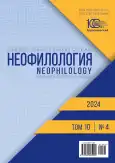Text units with purpose semantics in a discursive perspective
- Authors: Voronina L.V.1
-
Affiliations:
- Ryazan Branch of Moscow University of the Ministry of Interior of Russian Federation named after V.Y. Kikot
- Issue: Vol 10, No 4 (2024)
- Pages: 812-820
- Section: RUSSIAN LANGUAGE. LANGUAGES OF PEOPLES OF RUSSIA
- URL: https://journal-vniispk.ru/2587-6953/article/view/295621
- DOI: https://doi.org/10.20310/2587-6953-2024-10-4-812-820
- ID: 295621
Cite item
Full Text
Abstract
INTRODUCTION. The correlation of the terms “text units” and “discourse units” is currently opaque due to numerous approaches to defining text units and ambiguous decisions regarding discursive ones. The aim is to identify the features of the correlation of structural units of text and discourse and to establish the specifics of the rhetorical relations of Purpose at the element node level of discourse.MATERIALS AND METHODS. The research is conducted on the basis of contemporary mass media material through an unselected sampling from interviews with Russian political leaders using the methodology of the theory of rhetorical structures, general philological argumentation, as well as conversation and discourse analysis.RESULTS AND DISCUSSION. A structural-semantic dependence is established when identifying the correlation of text units with the purpose semantics and discursive units organized according to the principle of rhetorical relations of the purpose; the specificity of the rhetorical connections of Purpose as relations of the subject type, an asymmetric structure, characterized by a complete paradigm of the signs of polarity and direction is revealed.CONCLUSION. The study has prospects for further study of global structures of natural discourse, as well as practical significance in the context of computational linguistics in the development of algorithms for creating texts using artificial intelligence.
About the authors
L. V. Voronina
Ryazan Branch of Moscow University of the Ministry of Interior of Russian Federation named after V.Y. Kikot
Author for correspondence.
Email: lv-voronina@mail.ru
ORCID iD: 0000-0002-4333-6685
Cand. Sci. (Philology), Associate Professor, Associate Professor of Social and Humanitarian Disciplines Department
18 1 Krasnaya St., Ryazan, 390043, Russian FederationReferences
- Petrov S.V. Discourse as a unit of text. Obrazovanie i pravo = Education and Law, 2020, no. 10, pp. 249-251. (In Russ.) https://doi.org/10.24411/2076-1503-2020-11044, https://elibrary.ru/jhiivx
- Sheptala V.S. On the problem of comparison of the concepts “text” and “discourse”. Mezhdunarodnyi zhurnal estestvennykh i gumanitarnykh nauk = International Journal of Humanities and Natural Sciences, 2022, no. 7-20 (70), pp. 110-113. (In Russ.) https://doi.org/10.24412/2500-1000-2022-7-2-110-113
- Asratyan Z.D. Text, discourse, dicteme, language personality as basic concepts of text linguistics. Vestnik Ros-siiskogo universiteta druzhby narodov. Seriya: Teoriya yazyka. Semiotika. Semantika = RUDN Journal of Lan-guage Studies, Semiotics and Semantics, 2023, no. 1, pp. 138-151. (In Russ.) https://doi.org/10.22363/2313-2299-2024-15-1-138-151, https://elibrary.ru/dqmsru
- Prozorov V.V. A lyrical discourse/text as a speech genre crossover. Zhanry rechi = Speech Genres, 2021, no. 2, pp. 126-135. (In Russ.) https://doi.org/10.18500/2311-0740-2021-2-30-126-135, https://elibrary.ru/mzqoqx
- Zolyan S.T. Discourse, language (langue), language activity (langage). Metod = Method, 2020, no. 10, pp. 212-242. (In Russ.) https://doi.org/10.31249/metod/2020.10.12, https://elibrary.ru/oetonf
- Bocharnikova E.A. Discourse interrelation (medical and humanitarian discourses). Lingvistika i obrazovanie = Linguistics & Education, 2022, vol. 2, no. 4 (8), pp. 18-26. (In Russ.) https://doi.org/10.48612/astgmu/2022-2-4-18-26, https://elibrary.ru/ooleiu
- Demina D.A. Theological discourse as a special type of discourse. Vestnik Moskovskogo gosudarstvennogo lingvisticheskogo universiteta. Gumanitarnye nauki = Vestnik of Moscow State Linguistic University. Humani-ties, 2021, no. 8 (850), pp. 212-224. (In Russ.) https://doi.org/10.52070/2542-2197_2021_8_850_212, https://elibrary.ru/nzjcrs
- Shakirov S.M. Transmediality of advertising discourse. Znak: problemnoe pole mediaobrazovaniya = Sign: Problematic Field in Mediaeducation, 2022, no. 3 (37), pp. 64-70. (In Russ.) https://doi.org/10.24411/2070-0695-2020-10309, https://elibrary.ru/xckixx
- Petrosyan M.M. Linguistic specifics of horizontally and vertically directed communication in medical discourse. Russian Linguistic Bulletin, 2023, no. 8 (44), art. 40. (In Russ.) https://doi.org/10.18454/RULB.2023.44.40, https://elibrary.ru/dlxvgv
- Oparina E.O. Metaphor in discourse. Sotsial’nye i gumanitarnye nauki. Otechestvennaya i zarubezhnaya litera-tura. Seriya 6: Yazykoznanie: Referativnyi zhurnal = Social Sciences and Humanities. Domestic and Foreign Literature. Series 6: Linguistics, 2021, no. 3, pp. 131-141. (In Russ.) https://doi.org/10.31249/ling/2021.03.10, https://elibrary.ru/asrmrg
- Oleshkova A.M. Cognitive and ethical bases of discourse and discourse analysis. Obshchestvo: sotsiologiya, psikhologiya, pedagogika = Society: Sociology, Psychology, Pedagogics, 2022, no. 8, pp. 23-25. (In Russ.) https://doi.org/10.24158/spp.2020.8.3, https://elibrary.ru/zzcceq
- Kiose M.I. Linguistic creativity in discourse: the research perspective of cognitive semiotics. Ural’skii filologi-cheskii vestnik. Seriya: Yazyk. Sistema. Lichnost’: lingvistika kreativa = Ural Philological Herald. Series Lan-guage. System. Personality: The Linguistics of Creativity, 2020, no. 2, pp. 37-47. (In Russ.) https://doi.org/10.26170/ufv20-02-03, https://elibrary.ru/jmwkxb
- Karasik V.I. Self-expression in different types of discourse. Kommunikativnye issledovaniya = Communication Studies, 2022, vol. 9, no. 3, pp. 564-574. (In Russ.) https://doi.org/10.24147/2413-6182.2022.9(3).564-574, https://elibrary.ru/ftxeqd
- Rzheshevskaya A.A. Variance assessment in the construal of contemporary drama discourse. Vestnik Moskovs-kogo gosudarstvennogo lingvisticheskogo universiteta. Gumanitarnye nauki = Vestnik of Moscow State Linguistic University. Humanities, 2021, issue 2 (844), pp. 50-59. (In Russ.) https://doi.org/10.52070/2542-2197_2021_2_844_50, https://elibrary.ru/ltbsxc
- Zapol’skaya N.N. Text-work and its units: key textforms and textform keys. Vestnik Moskovskogo universiteta. Seriya 19. Lingvistika i mezhkul’turnaya kommunikatsiya = Moscow State University Bulletin. Series 19. Lin-guistics and Intercultural Communication, 2022, no. 4, pp. 20-32. (In Russ.) https://doi.org/10.55959/MSU-2074-1588-19-2022-4-20-32, https://elibrary.ru/mbbfat
- Riabkova E.S. Semantic – syntactic units of the text. The Scientific Heritage, 2022, no. 84, pp. 55-57. https://doi.org/10.24412/9215-0365-2022-84-4-55-57, https://elibrary.ru/lzahzk
Supplementary files









